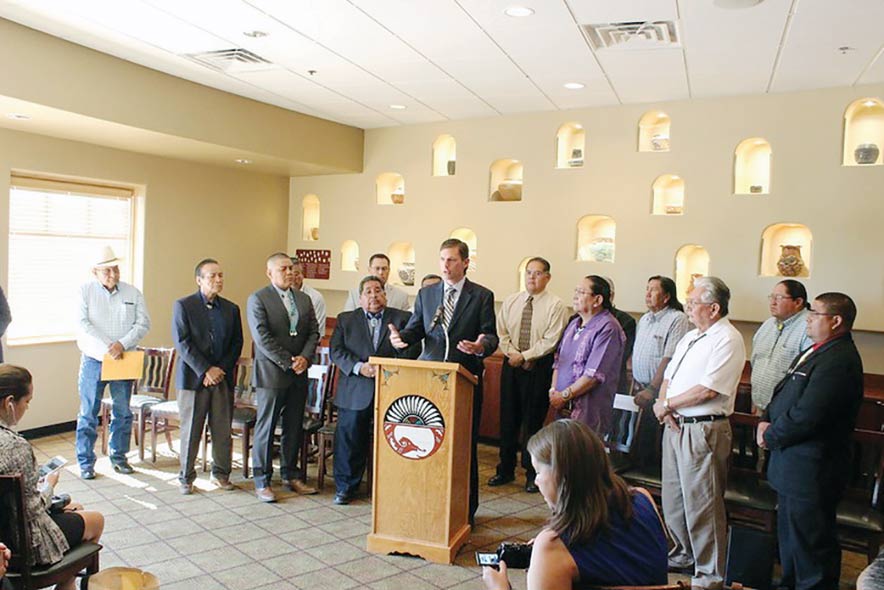
Proposed law aims to protect sacred cultural objects

Courtesy photo | Sen. Martin Heinrich’s office Surrounded by New Mexico tribal leaders, Sen. Martin Heinrich, D-N.M., speaks about the Safeguarding Tribal Objects of Patrimony Act, or STOP Act, during a press conference in Albuquerque in 2016.
By Colleen Keane
Special to the Times
ALBUQUERQUE
Aaron Sims, an attorney with the Chestnut law firm, which represents the Pueblo of Acoma, is waiting for the day when he and other tribal members don’t have to worry that sacred, ancestral items will be stolen and end up in overseas auctions.
“We find them on eBay,” he said, adding that auction houses in Paris, France, have become a hub for the sale of exported tribal objects.
Among other items, a ceremonial shield was stolen from a village home in the 1970s.
“These items of cultural patrimony have a specific purpose, a role within the community,” explained Sims, a member of the Acoma community.
“It is really devastating especially for the community to see (them for sale overseas) – almost like a member of your family being taken,” he said. “So, you can imagine the emotions that come with it.”
In 2016, then-speaker of the Navajo Nation Council, LoRenzo Bates, said the Navajo Nation expends an exceptional number of resources on the recovery of cultural items and will continue to do so.
Law needed
In attempts to bring their ceremonial shield home, Acoma leaders were blocked by French officials who said their hands were tied in efforts to get Paris auction houses to release cultural items since there wasn’t a law against exportation in the U.S.
“It wasn’t illegal to export these objects even though they were illegally stolen in the U.S., said Sen. Martin Heinrich, D-N.M., in an interview with the Times.
The Acoma shield returned home but it took decades along with extensive negotiation, which pointed more than ever to the need for stronger laws.
To fill the gap in U.S. laws, Heinrich sponsored the Safeguarding Tribal Objects of Patrimony Act, or STOP Act, in 2016 and has been trying to get it passed ever since with the help of tribes.
The STOP Act criminalizes the exportation of cultural objects and increases prison time from five to 10 years for an individual convicted of selling, purchasing, using for profit or transporting for sale or profit human remains or cultural items that were illegally obtained.
Among its provisions, the bill requires a process for the voluntary return of cultural objects, a Native American working group, and an interagency working group.
“I want to extend my sincere appreciation to Senator Heinrich for introducing this bill,” Bates said in a press release, “not only on behalf of the Navajo Nation Council but on behalf of Indian Country. I can’t emphasize enough that if it has happened to the Navajo Nation, then I’m certain it has happened all across Indian Country.”
The current version, S.1471 in the 117th Congress, was co-sponsored by 12 lawmakers including Sen. Ben Ray Lujan, D-N.M., and Sen. Lisa Murkowski, R-Alaska.
The companion bill, HR 2930, passed the House in early December of 2021.
“I thank Representative (Teresa) Leger Fernández for successfully taking up this fight in the House,” Heinrich stated in a press release after the House vote.
Heinrich explained that when Deb Haaland was in Congress, she had originally carried the legislation and when confirmed as secretary of Interior handed it over to Leger Fernández.
About the Senate version, Heinrich said, “I think we are closer than ever to getting this done. There is less opposition than we have had in the past.”
Heinrich’s goal is to get the bill on President Joe Biden’s desk for his signature by the end of this year.
“I’m optimistic we will get it done,” he said, adding it will give the state department the tools it needs to make their colleagues in other countries accountable.
Most impacted
“It’s been the tribes of the Southwest that have suffered the brunt of this,” said Sims.
A General Accountability Office report in August 2018 on Native American cultural property documents that 976 items from southwestern tribes showed up in overseas auction houses between 2012 and 2017, many times more than other tribes which range from 32 to 188.
In a 2017 address to Congress, former Acoma Pueblo Gov. Kurt Riley said besides the ceremonial shield, Acoma Pueblo has fought to recover many sensitive items that illegally taken from tribal lands.
“These sensitive items play significant roles in our culture, our traditional calendar, our societies, our families, and our way of life,” Riley said. “Most importantly, they are critical on how we pass our identity down to our children. Their loss threatens our cultural survival.”
Sims said it was important to understand the difference between cultural items and objects of commercial art.
“There is a clear difference between what is an item of cultural patrimony and something that is created for commercial purposes,” he said.
Sims said cultural items are different from commercial art by having a community caretaker.
“Think of it like a trustee,” he said.
When the items under community trusteeship are “being sold at auction this immediately tells us that something wrong happened,” he said. “It is like seeing it out in the wild. We know it was inappropriately removed.”
Heinrich said that he received support from every single tribe in the state of New Mexico for the STOP Act.
“The support has been incredible,” he said. “It’s unfortunately a commentary on how widespread this problem is.”
“We are in total support of this legislation to help secure and protect our cultural heritage,” said Karl Duncan, Mandan, Hidatsa and Arikara, the executive director of Pojoaque’s Pueblo’s Poeh Cultural Center.
“(People like me) who work in the museum cultural field, we see what we can do to preserve the culture with classes and workshops,” he said. “It’s critical to know how (cultural objects) were made, to understand the symbols and the images on them, (which only can be passed on if they are at home in their community).”
Sims, who would like to see the STOP Act passed as soon as possible stressed, “We see the STOP Act as a form of sovereignty (aimed at) protecting the cultural community that creates our identity and instills core values.
“Without those (cultural) items,” he said, “we lose the essence on how to be good people, good neighbors and family members. That is why we need those objects protected, and not stolen and taken away from us.”
Information: heinrich.senate.gov, congress.gov, YouTube Governor Riley of the Pueblo of Acoma and testimony on STOP Act.








 Highway 264,
Highway 264, I-40, WB @ Winslow
I-40, WB @ Winslow